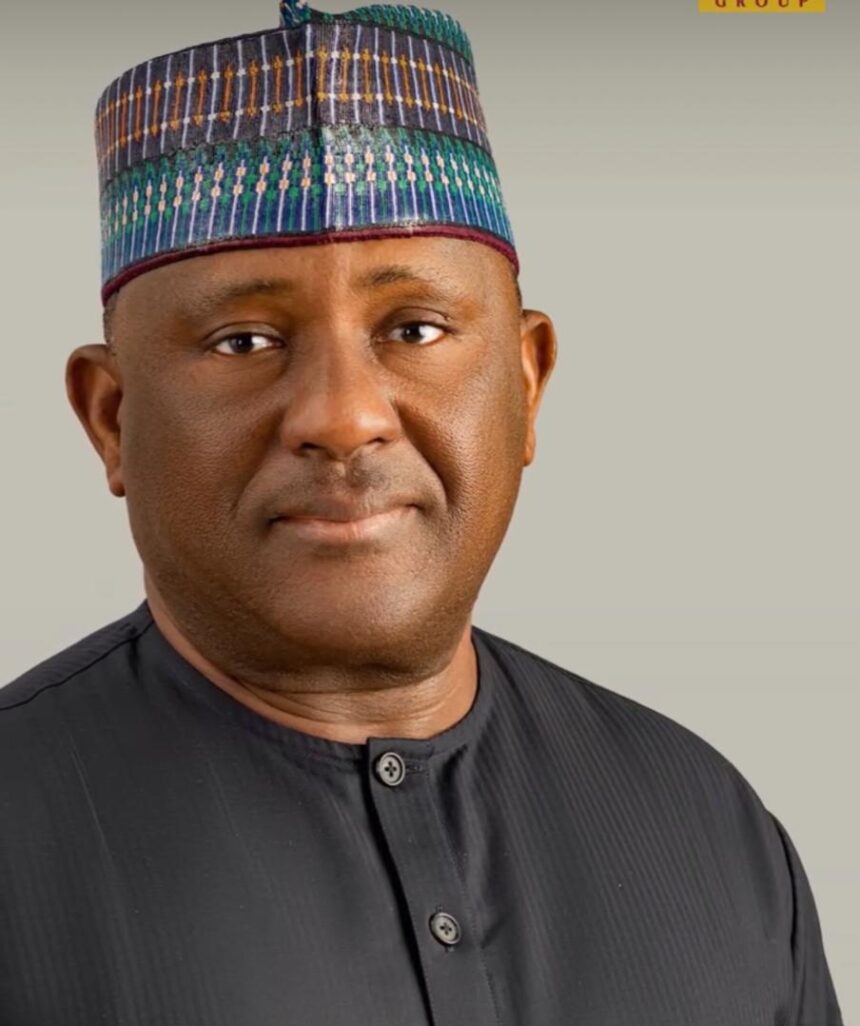●Pillar of Grace: The Business Sage Who Gave Africa Its Bread and Soul
● Nigeria’s Silent Giant Marks a Milestone of Industry, Impact
The calendar may announce another August, but time itself bows this year to a man who has mastered its passing with unparalleled grace and grandeur. Alhaji Abdulsamad Rabiu turns 65 neither with trumpet nor tambourine, but with the quiet triumph of a life deeply given. His journey is not one of mere accumulation, but of consecration: of wealth turned into wells of compassion, of influence poured gently into forgotten places. Amid a nationwide clamour for patriots and visionaries, Rabiu emerges as a purveyor of mercy, sowing seeds of growth where boardroom savvy meets heart, and enterprise kisses empathy. Thus this piece is less about his business savvy at 65, a great deal has been written on that; rather it is more about his peerless philanthropy and how he has made his private fortune a lifeline for the poor and underprivileged, writes LANRE ALFRED.
Abdulsamad Rabiu has never needed a stage to function as a human. He traverses beyond the allure and theatre of spectacle, where the truest power resides in service and sacrifice; in the soft, steady reshaping of broken lives. As he clocks 65 today, August 4, the world pauses, not simply to mark a date on the calendar, but to honour a legacy rooted in silent sacrifices, luminous success, and boundless giving.
At 65, Rabiu does not stand atop an empire to be applauded, but among his people to be remembered, not for noise, but for nurture; not for fame, but for fruit. His is the legacy of a builder who laid bricks both in cities and souls. In six decades and five years, the billionaire magnate has succeeded in carving both a fortune and a future, for those the world tried to overlook.
The tides of time may rise and fall, but a man like Rabiu stands unmoved, like the proverbial ancient baobab, whose shadow stretches across generations. Through the fires of industry and the balm of philanthropy, he has forged a business dynasty and humane movement that lifts the weary, emboldens the broken, and dignifies the forgotten.
Rabiu strides through Africa’s economic and philanthropic landscape like a quiet colossus, never seeking the limelight, yet illuminating lives with every step. At the helm of BUA Group, his industrial acumen birthed cement cities and sugar fields. But it is through his charitable spirit that he reveals the truest architecture of his soul: the deliberate, unrelenting desire to ease the ache of existence.
Described as “The Pillar of Prosperity,” Rabiu’s life is a grand ballet of benevolence, a choreography of conscience where every act of giving pirouettes into history. Not merely the act of a kind man, his philanthropy emerges as the ritual of a visionary, one who sees beyond figures and formulas, who understands that healing a nation begins with restoring its people.
Where others see policy, Rabiu sees people. Where governments falter, he extends a hand. He is not moved by applause, but by the muted sob of a widow, the silent potential in a girl’s eyes, the hunger buried in the belly of a struggling community.
Rabiu turns 65 not merely as a Nigerian titan or an African patriarch, but as a full citizen of humanity, one whose wealth was never a monument to self, but a ministry to others. At 65, his journey reads both like a résumé and a scripture, each chapter a credo to what one man can do with clean hands, clear eyes, and a conscience tuned to the cry of the forgotten.
Charity, not theatre
From the ravaged creeks of the Niger Delta to the sunburnt hamlets of Northern Nigeria, Rabiu’s touch is etched not in gold but in lives, restored, empowered, dignified. His interventions are not the grand theatrics of performative charity, but the deliberate architecture of care: widows given voice and trade, girls in hijabs coding their way out of poverty, first-time homeowners laying foundations with discounted cement that now costs less than despair. His legacy is not in buildings that scrape the sky, but in homes that hold the weary. Not in speeches, but in silences filled with relief. In every space where government gaps widen and hope thins to a whisper, Rabiu steps in, not as rescuer, but as restorer.
His philanthropy does not flow from guilt or surplus, but from design. He understands that the soul of a nation is measured not by its GDP but by how it treats its most invisible citizens. Through his Abdul Samad Rabiu Africa Initiative (ASR Africa), he disburses not only funds, but futures. Technical mentorship for young women in science and engineering. Access to capital for widows turned entrepreneurs. Scholarships for those born into silence but destined for song.
Rabiu proves that greatness is not forged in office but in obedience to one’s better nature. His cement factories boom, yet his heart speaks louder than his machines. He is a capitalist who bleeds empathy, a businessman who believes the only true wealth is what you give away. His 65th year arrives both like a milestone and a coronation, of character, sacrifice, and a life lived wide open to the needs of others. And while monuments may fade, Rabiu’s impact deepens with every passing day, etched into the souls of those who once had nothing, but now have a name, a trade, and a future.
At the IWS Skills Acquisition Centre in Lagos, for instance, more than 200 widows received not just tools, but dignity. Hairdryers and sewing machines, cake mixers and cash, each gift a symbol, each widow a seed now nurtured by the rain of Rabiu’s compassion.
The lifeline to over 200 women wasn’t merely a donation, but the recalibration of 200 bloodlines. It was policy reimagined as poetry. Beneath it all lies Rabiu’s quiet creed: that compassion is not an act of charity but a function of citizenship.
These were not random acts of charity. They were acts of recalibration, placing economic independence in trembling hands, placing hope in homes long silent. The donation was widely applauded as a manifesto of his enduring mercy. And of course, the ripple spread: coolers found kitchens, POS machines found markets, and women found voices. The Lagos State Commissioner for Tourism, Mrs. Toke-Benson Awoyinka, stood in silent awe, alongside Mr. Ubon Udoh of the ASR Foundation, as the widow of the city learned once more to dream.
Yet Rabiu’s philanthropy is not about spectacle. It is surgical. It seeks wounds that policies often miss, gender inequality, economic exclusion, housing deficits, and answers them with precision. The ASR Africa tech mentorship for Northern girls became a lighthouse in a sea of forgotten daughters. Not merely training, it offers translation, translating latent brilliance into living legacies, equipping young women to dream in codes and build in algorithms.
Where the world sighs at Africa’s problems, Rabiu invests in its possibilities. He does not merely give, he engineers empowerment.
His decision to radically slash cement prices is perhaps the most audacious act of economic patriotism in modern Nigeria. Not a gimmick, but a gesture of architectural mercy, he has turned cement into seed, and homes have grown from the gravel. This move has transformed not only the housing sector but the national mood, lowering the burden for first-time builders, rural dreamers, and young families desperate to escape the tyranny of rent.
Brick by brick, he reimagines the country’s skyline, not with skyscrapers alone but with accessible, affordable sanctuaries for the common man. His cement builds more than homes, it constructs security, stability, and belonging.
Each industry he touches becomes a tributary to a river of national development. Sugar, flour, real estate, oil, Rabiu’s business ecosystem breathes life into communities, while his philanthropic lung exhales compassion.
At 65, he remains startlingly hands-on. In every boardroom and every village hall, his presence lingers both for its compassion and care. He is the rare patriarch who walks among his people without pretense, listening to whispers the world ignores. His humility is not a strategy, it is the soil in which his greatness grows.
To women-led startups across the continent, his $1.5 million donation to the IFC’s SheWinsAfrica initiative signals more than funding, it is the validation of dreams. It is the thunderclap of endorsement echoing across borders, reminding women that leadership is not a borrowed space but an inherited right.
Makhtar Diop of the IFC announced the gift not with a press release, but with reverence, his post on social media read like scripture, a public ode to Rabiu’s relentless vision for a more inclusive, resilient Africa. And in that moment, Rabiu became more than a benefactor, he became a midwife to the future.
His giving is not transactional. It is transformational. It does not seek credit, but change.
His surgical compassion
Where the state fails to see, he responds with the precision of a surgeon and the tenderness of a sage. The Abdul Samad Rabiu Initiative (ASR Africa) has become a lifeline where government bureaucracy falters. Through it, he repairs the fractures in Nigeria’s human development, providing infrastructure for education, funding health interventions, and bolstering social development with an integrity that state institutions often lack.
Yet Rabiu remains remarkably understated. He does not flaunt wealth. He wears simplicity like regalia. His life is a study in restraint and result. Unlike those who erect statues to themselves in life, Rabiu builds legacies in others.
Young Nigerians hail him not just for his business genius, but for the poetry of his quietude, the dignity in his distance from noise, the inspiration in his action-over-words approach. He mentors by example. No Instagram theatrics, no political bandwagoning. Just vision. Just results.
To the countless small-scale entrepreneurs his programs have supported, he is not a billionaire in marble halls. He is the unseen hand behind their success stories, the architect of unseen infrastructure, networks, capital, belief.
And belief, ultimately, is what Rabiu gives most generously. He believes in people. In their capacity to rise. In their ability to rewrite their own stories, if only someone would hand them the pen.
At 65, the narrative of his life gathers into a crescendo, yet he moves without fanfare. He has nothing left to prove, only more to give. This is a man whose biography is not in headlines but in households saved from collapse, in young girls armed with code, in mothers restored to grace.
To describe Rabiu merely as a businessman is to mistake a cathedral for a stone. He is an institution, yes, but more so, an inheritance. His legacy will outlive markets. His name will nest in villages where his feet may never tread, but where his heart already dwells.
He embodies the sacred symmetry of power and service. He teaches us that to be truly great is not to be known but to be felt, deep in the marrow of the forgotten, where philanthropy is not showmanship but sacrifice.
And so as the calendar turns to August 4, the celebration is not his alone. It belongs to the women who can now feed their children, the students who now dream in binary code, the families laying the foundations of their first home, the widows who no longer beg but build.
Abdulsamad Rabiu is 65. Yet in the algebra of legacy, his numbers do not lie in years but in lives. His success is not measured in profits, but in prayers. Not in what he has built, but in what he has blessed.




